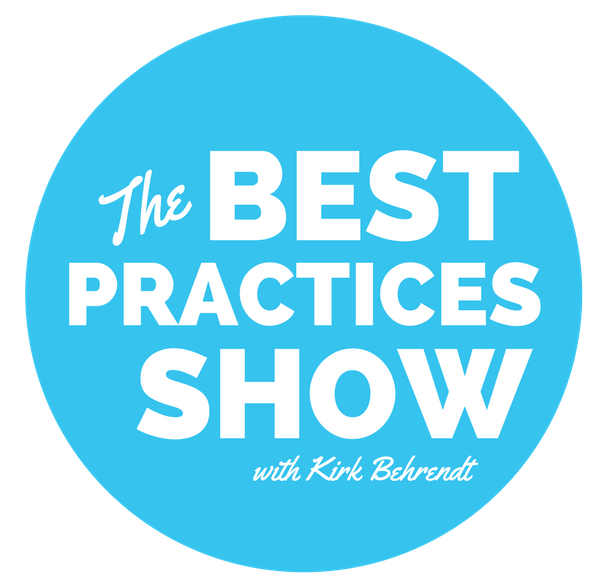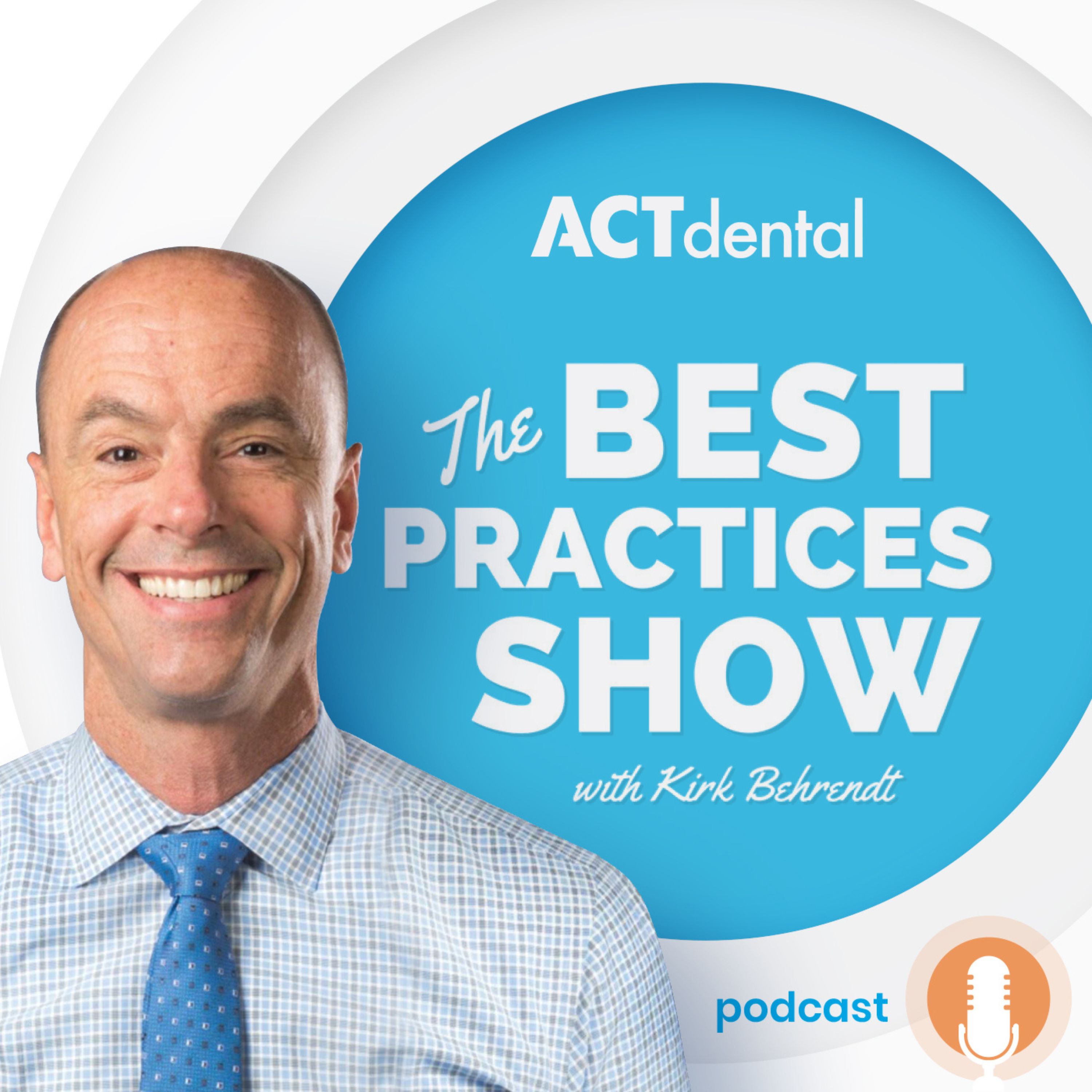Episode 504
504: Dentures Need Suction but They Don't Have to Suck - Dr. Wendy Clark
504: Dentures Need Suction but They Don't Have to Suck - Dr. Wendy Clark
Dentures get lost and broken — and that sucks. But your duplication process doesn't have to! And to convince you that dentures can be fun, Kirk Behrendt brings back Dr. Wendy Clark, an expert prosthodontist from UNC-Chapel Hill, to share what dentists get wrong and the advancements that have been made in the digital space. Digital dentures don't suck! To learn more about why they're great for you and your patients, listen to Episode 504 of The Best Practices Show!
Episode Resources:
- Dr. Clark’s Facebook: https://www.facebook.com/wendy.a.clark.9
- Dr. Clark’s social media: @drwendysworld
- Subscribe to the Best Practices Show Podcast
- Join the To The Top Study Club
- See our Live Events Schedule here
- Get the Best Practices Magazine for Free!
- Write a Review on iTunes
Links Mentioned in This Episode:
Carbon: https://www.carbon3d.com
Mission of Mercy: https://www.amissionofmercy.org
The Cupcake Technique by Valerie Cooper: https://www.youtube.com/watch?v=bl34KCyC5Yo
Main Takeaways:
3D printing is the future.
Digital makes dentures predictable.
You don't need a scanner to get started.
Digitizing is better for you and your patients.
Don't underestimate the value of record preservation.
Quotes:
“You really can't underestimate, in all of your practice, being kind to staff. It takes you to the next level.” (4:58—5:04)
“A lot of people don't like dentures, which I've never understood. But I always like to get in the psyche. And I think it’s because they're not very predictable. I tell my students you can do every single step correctly, every single step perfectly, and then it goes through processing, and there's an error. And that insertion appointment, your denture doesn't fit. And in practice, that's no fun. When you're a dental student and it takes you like 18 appointments to make a denture, and then you don't get to insert it at that appointment, it’s the worst sinking feeling.” (6:33—7:04)
“How can we make [dentures] more predictable? And digital dentistry is why it’s there, so you can get that predictable fit, support, stability, and retention, that suction. But dentures don't have to suck. They can be fun.” (7:07—7:19)
“Digital dentures have gotten such a bad rap . . . The first lecture I did on digital dentures was actually 2013, so I hope I'm starting to learn my stuff. And from that first lecture I did in 2013 to the last lecture I did last week, I always get the question of, ‘I don't have a scanner. I can't do this workflow. How can I do this workflow?’ And the great thing is, you don't have to have a digital scanner. You can jump into the workflow by digitizing your impressions.” (8:52—9:30)
“By now, most full-service laboratories will have a benchtop scanner of some sort. They can put your denture impressions in that the same way they put your crown and bridge impressions or your models for crown and bridge. So, truly, if you can partner with a dental laboratory that has that technology benchtop, you can send whatever impression material you're already using to your lab. So, take your PVS, take your alginate, and pour it in stone. Send a cast. The cast can get digitized. You can jump into the workflow at any point. So, don't be hesitant to try this new workflow and this more predictable denture technology because you haven't invested in a scanner yet.” (9:31—10:10)
“The first time I touched a CEREC was the CEREC 3 with the rollerball. And so, I think anybody that's been in the CEREC world knows the pain of using the spray and trying to keep everything isolated and trying to use the rollerball as a mouse instead of a touchscreen or a keyboard. And it was a process to try to trace that margin with a rollerball. And now, as technology has gotten better and started to catch up and become more affordable, the workflows have really opened up.” (10:19—10:49)
“When I was in practice, I remember everybody had the bad connotation of those first CEREC crowns. They were like, ‘Augh, they're not pretty. The margins are bulky. They're not polished right. Labs will always do better.’ . . . But CEREC crowns, now, are pretty. And if you follow the protocols right and you know what you're doing, you'll get a good crown. And the same thing with digital dentures. The first cases we did with the first 3D printed resins, when they first FDA-cleared, were not as strong as the PMMA that we used to use. And it didn't look the same. It didn't feel the same. It didn't polish the same. And so, it was hard to jump into that workflow where you're saying, ‘Well, digital dentures all suck.’” (10:50—11:49)
“I think that the value of record preservation is totally underestimated. Even if you have a conventionally made denture and you scan it and keep that in your records, now you have a digital preservation of what this patient always has. So, in a week, they lose their denture, they go on a cruise, and it falls overboard — I had a patient scuba diving and their denture fell out — rather than start at the beginning, and again, I work in a dental school where dentures are not necessarily two or three appointments. It can be a long process, start to finish.” (12:28—13:05)
“I had a patient last week whose denture was lost in the hospital. And I had to start from scratch because it was not done digitally. And so, you think about just the opportunity to save the patient’s time and to save your chair time by maintaining these digital records, is huge.” (13:06—13:21)
“We have to shift our lens. When you think about access to care, to me, that's one of the most underestimated aspects of 3D printing. We’re always comparing apples to oranges where, yeah, if you have a master ceramist like I had in my practice design me and handcraft this crown on number eight that they're custom staining chairside — it’s not going to look as good if I'm in my office printing something out on my printer that I'd done myself. But if I am at a service clinic and a patient can get a root canal for free, but they can't get anything but an amalgam to restore it with — and yes, we’re still using amalgam — then what service are we really doing for this patient? We’re stopping the service at an incomplete point.” (13:23—14:08)
“3D printing is our future. I think conventional hand-processing will always exist. And it always needs that human touch, so I don't think we’re going to be replaced by robots. But I think robots are going to make our lives more predictable.” (16:14—16:28)
“I'm going to appeal to all my denture technicians out there where the patient loves their dentures, and they want it duplicated. Man, it is so much harder than you would think to put those teeth in the same spot. You're working on all these putty matrices and trying to reposition everything. And you can get so close. And then, the patient is like, ‘Uh, I think this one’s a little shorter.’ When you scan it and duplicate it, you're like, ‘Nope, it’s a 1:1 copy! I have the digital file to prove it!’ And it helps with that predictability.” (19:42—20:11)
“If you have not ever done a digital denture in your life and you're still on that fence like, ‘I don't know if I want to do it. It’s a little bit intimidating. I don't know what the product is going to be like,’ immediate dentures are the way to go. And if you've ever made an immediate denture, they're the worst dentures.” (20:14—20:31)
“With digital, you have that preservation of record. I know that the incisal edge on my immediate is exact to where the incisal edge was of the patient’s pre-treatment, pre-extraction records. And then, you can always go back to the pre-extraction records. If the patient says, ‘Ah, you made my teeth too big,’ you can look and see if the teeth you chose are bigger than the pre-extraction records. You could never do that with conventional, and it unlocks so much possibility to eliminate that unpredictability. And so, they make immediate dentures not suck.” (21:03—21:37)
Snippets:
0:00 Introduction.
1:52 Dr. Clark’s background.
5:16 Dentures need suction, but they don't have to suck.
7:20 The Carbon printer.
8:25 Myths about dentures.
10:10 CEREC of old versus the CEREC of new.
12:08 What dentists get wrong about digital dentures and 3D printing.
15:02 The future of dentures and 3D printing.
17:20 Learning from her students.
18:27 Favorite tips and tricks for dentures.
21:49 Last thoughts.
25:32 How to get in touch with Dr. Clark.
Dr. Wendy Clark Bio:
Dr. Wendy Clark completed her undergraduate training at the University of Georgia in Athens, Georgia, then earned her doctoral degree from the Marquette University School of Dentistry in Milwaukee, Wisconsin. She then earned her master’s degree in clinical dentistry and certificate in post-graduate prosthodontics from the University of Alabama at Birmingham School of Dentistry. She practiced prosthodontics for seven years with Team Atlanta (Goldstein, Garber & Salama). Throughout this time, she lectured nationally on a variety of topics ranging from smoking cessation to dental implants. She was named a “Leader in Continuing Education” by Dentistry Today in 2017 and 2019. Currently, she is full-time faculty at the University of North Carolina Chapel Hill in the Department of Prosthodontics.
Dr. Clark is a board-eligible prosthodontist, currently pursuing certification from the American Board of Prosthodontics. In addition to poster presentations at national meetings, she has co-authored articles published in the Journal of Prosthetic Dentistry, the Journal of Prosthodontics, Compendium, and the Journal of The American Dental Association. Current research and lecture topics include digital dentures, curriculum innovation, and bioactive restorative materials.


